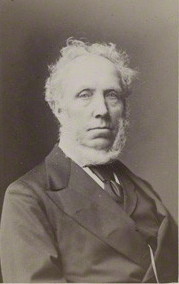Sunday, 12 May 2013
145 Edward Baines
Constituency : Leeds 1859-74
Edward was the son of a newspaper proprietor of the same name, the owner of the Leeds Mercury. Both his father and brother had been MPs for Leeds , Edward taking over from the latter, whose health was failing, in 1859.
The Leeds Mercury was one of those great provincial newspapers that did so much to promote the Liberal cause in the boroughs and he probably did more for the party outside the House than in it. Edward had a powerful non-conformist conscience and gave great commitment to causes such as the abolition of slavery, working class education on a strictly voluntary and secular basis, temperance ( he was a strict teetotaller ) and the abolition of the corn laws. However the paper did reflect the manufacturers' interests in opposing factory legislation. He was a notable local party boss. He was a witness to the Peterloo massacre. Palmerston's elevation of his brother Matthew to his first Cabinet was thought to be motivated by a desire to keep the Mercury on side. Edward for his part was willing to endorse Palmerston who was "moving with a firm step in the paths of reformation and improvement". Like Cobden he had an exalted sense of middle class virtue writing in 1840 "we do not believe that there is in the world a community so virtuous , so religious and so sober minded as the middle classes in England".
Edward did clash with Palmerston over the methodology for the 1861 census. The government sought to determine the extent of religious allegiance by asking at people's houses rather than taking a head count at church or chapel. Edward and his Dissenting allies immediately saw that this would vastly increase the number of Anglicans over the 1851 figures which had suggested a rough parity between Church and Dissent. They forced the government to abandon the proposal. Palmerston was angry at "the unreasonable bidding of a central cabal wielding an organized hypocrisy" but he realised he had to give way. Edward did not want to give further trouble to the ministry and did not push his triumph as others may have done.
Edward was the leader of the "voluntaries" , those Nonconformists opposed to any state involvement in religious teaching. He opposed Graham's proposals for the education of factory children in 1843 as extending Anglican hegemony - "educational dictatorship" in Edward's phrase.
Edward saw India as "a great commercial adventure...our main object, as a people, is not to civilise or to Christianize.. We hold India, as a nation , for the sake of opening up its commerce, and so of extending .. our own".
In Parliament Edward was most noted for an annual motion in favour of a reduction in the borough franchise. In his general politics he was moderate rather than a Radical. The purpose of his annual motion was to defuse tension and ensure that Parliament wouldn't " ever be composed of lower-class men or fail to contain the foremost men in the kingdom". He was enthusiastic about Cobden's commercial treaty with France and spoke up for it in the House.
Edward was also a prolific author with works on the Lake District and various political topics published.
Edward stood down in 1874 and died in 1890 aged 90.
Subscribe to:
Post Comments (Atom)

No comments:
Post a Comment